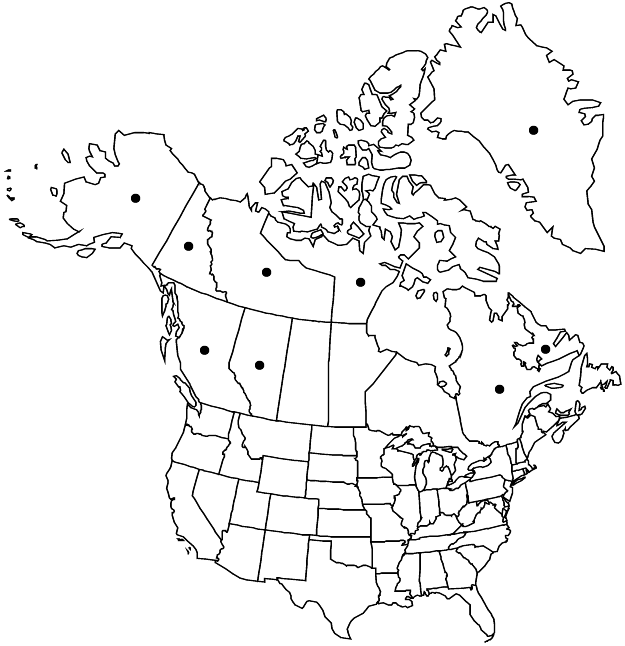Difference between revisions of "Micranthes nivalis"
in N. L. Britton et al., N. Amer. Fl. 22: 136. 1905 ,.
FNA>Volume Importer |
FNA>Volume Importer |
Revision as of 20:27, 24 September 2019
Plants tufted, with bulbils on caudices. Leaves basal; petiole flattened, (0.4–)1–4 cm; blade ovate to ± round, sometimes elliptic or oblong, (0.5–)1–4 cm, thick, coriaceous, base attenuate to ± truncate, margins serrate to dentate on distal 2/3 (sometimes more), proximally ciliate, surfaces ± densely tangled, reddish brown-hairy abaxially, glabrous or glabrate adaxially. Inflorescences (5–)10–40-flowered, congested, almost capitate thyrses, (3–)7–20 cm, ± densely purple-tipped stipitate-glandular. Flowers: sepals erect, spreading in fruit, ovate to deltate; petals white, sometimes pink tinged, not spotted, oblong to ovate, clawed, 2–4 mm, ± equaling sepals; filaments linear, flattened; pistils connate ca. 1/2 their lengths; ovary 1/2 inferior, appearing more superior in fruit. Capsules green, becoming reddish to purplish, folliclelike. 2n = 60.
Phenology: Flowering summer.
Habitat: Open, mossy tundra, rocky ridges, or shady ledges
Elevation: 0-1500 m
Distribution

Greenland, Alta., B.C., Nfld. and Labr. (Labr.), N.W.T., Nunavut, Que., Yukon, Alaska, Europe, Asia (Himalayas, Kamchatka, Siberia).
Discussion
Micranthes nivalis is closely related to M. tenuis. All records of M. nivalis in the United States (except Alaska) appear to be misapplied to or misidentifications of M. aprica, M. occidentalis, or M. rhomboidea. Occasional, dwarfed specimens of M. hieraciifolia and M. subapetala are similarly mislabelled.
Selected References
None.